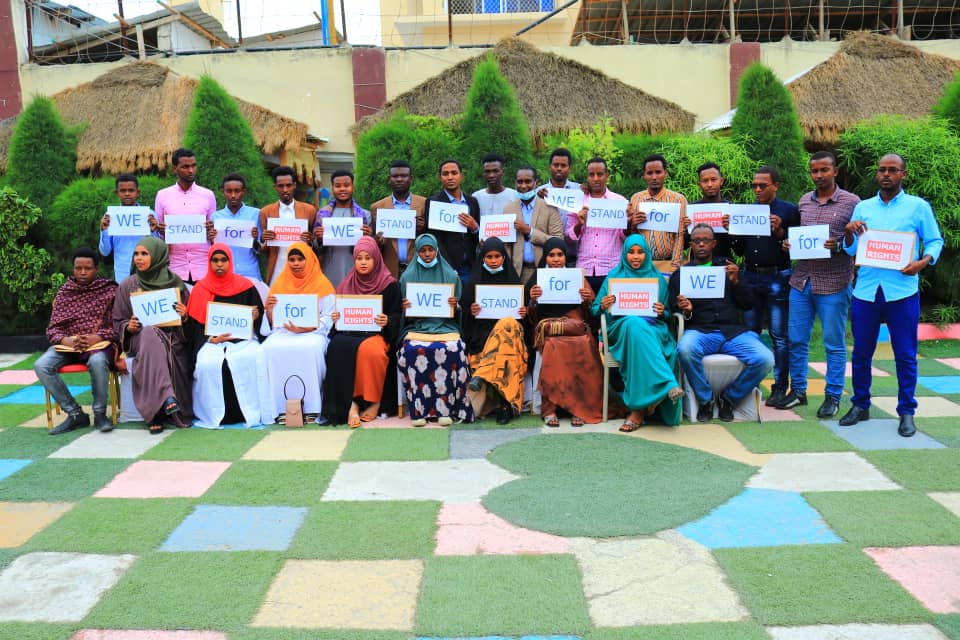
Safety concerns, lack of skills impeded Somali journalists' coverage on human rights abuses, say journos

Aweys Bashir Abdirahman, 26, mainly covers social affairs reporting for Radio Risaala in Mogadishu.
"Insecurity is the biggest problem we face. Victims of abuse do not want to speak out for fear of repercussions. Women in the camps are particularly reluctant to speak up, ”he said. "My recent radio report could not go further because the victims do not want to tell their story".
Telling stories that have been ignored is a difficult task, according to journalist Hana Mohamed, producer of a women's program and reporter for Himilo community radio in Mogadishu.
She says that after learning new skills during the #HumanRightsJournalism training with mentoring support from the Somali Journalists Syndicate, she hopes to produce more stories that will benefit the community.
"Journalists always need new skills. Now we are better equipped. We have been taught many topics that affect our communities in their day-to-day lives. I hope to use this information and skills and be the voice of the voiceless people in Somalia,” she adds.
Likewise, journalists covering violations have to take extra precautions or simply end up abandoning assignments because they lack the guidance to balance the risks they take while ensuring that public interest stories are told. in the most precise way.
"During my recent report, I had to cover a story about mothers who complained about missing family members. But I was very scared. Even the tuk tuk taxi driver warned me. That day, I came home without doing anything,” said 25-yr-old Isak Maalin, Goobjoog TV reporter.
"If I could have some mentorship support, I hope I could do my job better,” he adds, "safety is essential whenever a journalist has to take on a human rights assignment”.
Women who witness sexual violence, especially in high profile cases or those committed by state security forces, are reluctant to speak out, making it difficult for journalists investigating such violations to report them with precision.
Nasteho Mohamed who reports for independent radio Hiigsi, says the three-day training opened a new window of opportunities and tools for reporting credibly on women's issues. For her employing learning the best practices in confidentiality and privacy for victims of gender-based violence is a fundamental subject.
"What I learned from the training is really useful and has informed my skills as a female radio reporter. Victims of sexual violence not only need their stories to be heard, but also they need respect in their privacy. They also need support and guidance, so it is important to provide the essential information they need and connect them with locally available resources,” notes Nasteho.
Abdalle Ahmed Mumin, the secretary general of Somali Journalists Syndicate (SJS) said the training not only revealed the journalists’ interest towards human rights but it will improve the quality of their work.
"Local journalists often deal with human rights issues but they used to make mistakes due to poor understanding and inadequate training and support. Thanks to the support from the National Endowment for Democracy, now these journalists are better equipped to cover issues affecting Somalia’s human rights appropriately,” Mr. Mumin said.
Armed conflict and poor governance still hamper Somalia’s to effectively demonstrate progress in the human rights situation of the country. Local rights groups, including journalists and media community are those who suffer most while the Somali federal government, which received international praise for its planned economic reforms, had done little progress with security and judicial reforms.
Leave a comment
- Popular
- Rated
- Commented
04/11/2021 - 11:05:02
12/03/2023 - 22:58:08
22/01/2023 - 11:24:06
13/12/2015 - 09:27:08
01/03/2021 - 09:00:37
Opinions
17/05/2024 - 23:10:22
14/05/2024 - 21:03:09
30/04/2024 - 01:33:18
Politics
06/05/2024 - 02:52:53
02/05/2024 - 23:52:49
30/04/2024 - 01:33:18
Terror Watch
12/05/2024 - 00:19:20
07/05/2024 - 15:08:55
Press Releases
18/05/2024 - 10:24:36
 0
0 


































Safety concerns, lack of skills impeded Somali journalists' coverage on human rights abuses, say journos
MOGADISHU, Somalia (HORN OBSERVER) - Somali journalists say security concerns and lack of appropriate skills prevented them from reporting human rights stories in their communities as they completed a three-day training session supported by the Natio